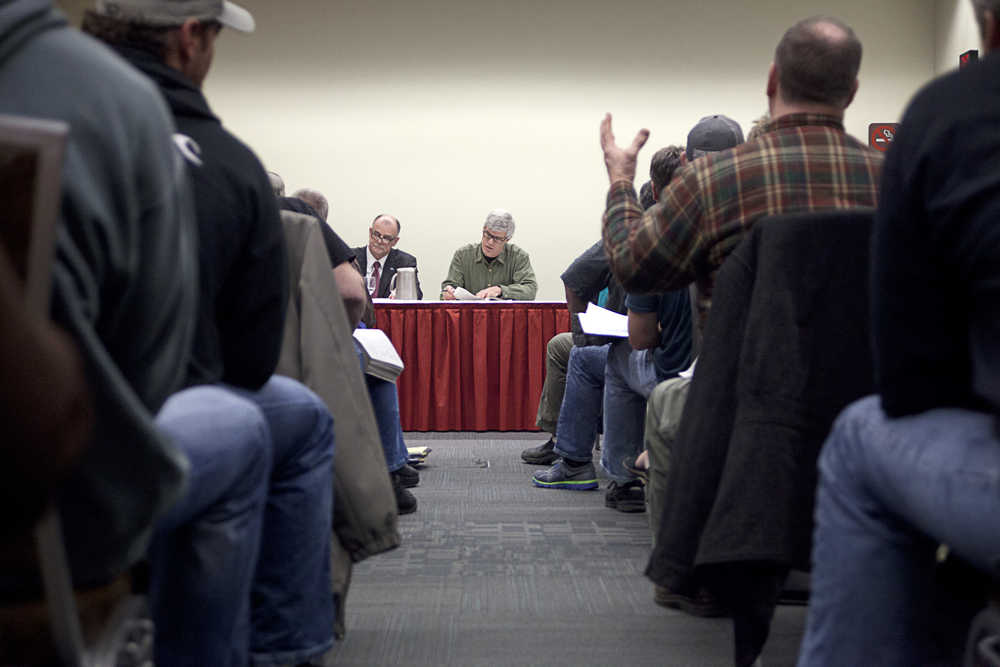ANCHORAGE — The Alaska Public Offices Commission received and rejected 14 complaints regarding lobbying at Upper Cook Inlet Board of Fisheries meetings.
Alaska’s Board of Fisheries is responsible for making certain fisheries management policy decisions for the state, including setting seasons and bag limits for fisheries along with methods and means for taking fish, and making allocative decisions between user groups.
The complaints, filed Sept. 10, asserted that seven individuals and the Matanuska-Susitna Borough did not follow state regulations about lobbying disclosures in 2011 and 2014.
Each of the individuals attended either the 2011 or 2014 Upper Cook Inlet Board of Fisheries meeting, or both, and, according to the complaints, was reimbursed or compensated for attending and advocating for certain issues, but did not register as a lobbyist.
The individuals were either members of the Matanuska-Borough’s Fish and Wildlife Commission, contracted by that body, or employees advocating on behalf of other Cook Inlet sportfishing interests.
The Matanuska-Susitna Borough similarly did not file the requisite disclosures after reimbursing many of the same individuals for the meeting or meetings, the complaints assert.
When APOC receives a complaint, staff first looks at whether it meets several technical standards, and whether the alleged issue would constitute an actual violation of state law if the complaint were proved true. These complaints would not. Each was rejected because advocacy at state Board of Fisheries meetings is not considered lobbying, according to APOC Executive Director Paul Dauphinais. That’s for two reasons. The state’s statute on lobbying exempts public sessions of the legislature and public meetings of other state agencies. Board of Fisheries meetings are open to the public, so state regulations regarding lobbying don’t apply to activity there, according to Dauphinais. Anybody who wants to petition the board of fisheries, or any other state board, at a public meeting can do so without being subject to lobbying regulations, said APOC’s Joan Mize.
Advocacy at Board of Fisheries meetings also is not considered lobbying because the board’s action does not fall under the state’s definition of administrative action, Mize said. For an activity to be lobbying, it must be attempting to influence legislation or administrative action. Since the board of fisheries is not doing either, activity there isn’t governed by the lobbying rules, Mize said.
The definition of administrative action excludes “the issuance, amendment or revocation of a permit, license or entitlement for use under existing statutes, regulations, or policies by the agency authorized to issue, amend, or revoke the permit, license, or entitlement for use.”
Mize said the changes to how the fishery is managed are often considered changes to the entitlement for use, one of the exclusions in the administrative action statute.
For example, when the Board of Fisheries changed the area drift fishermen could prosecute, it was an amendment to an existing entitlement. That’s specifically excluded from the administrative action that is regulated by lobbying laws.
The complaints were lodged by 12 individuals from Anchorage and the Kenai Peninsula, most of whom have ties to Cook Inlet’s commercial fisheries.
At the 2014 Upper Cook Inlet meeting, the board made several changes to area fisheries.
The individuals named in the complaints generally argued in favor of commercial fishery restrictions, and did so successfully. The Mat-Su fish commission successfully advocated for changes to drift fishery management that the commission said would allow more silver salmon to migrate to Northern District streams.
This is the second round of fisheries-related APOC complaints. In August, nearly 200 complaints were submitted to APOC regarding the Kenai River Sportfishing Association’s Kenai River Classic, and other outreach and lobbying of public officials regarding fisheries management.
The commission accepted three of those for hearing, which will likely occur within 90 days of Aug. 27, and rejected the remainder. APOC staff is expected to finish reports on those complaints by the end of September.
Molly Dischner can be reached at molly.dischner@alaskajournal.com.

